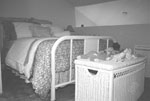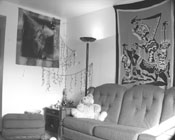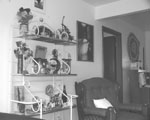By Natascha Terc staff reporter If worrying about what you're going to do for the rest of your life isn't stressful enough, being on your own for the first time can be a scary and exciting time.
TCU students have a variety of living options available to help make this transition with at least some of the comforts of home. Freshmen at TCU are required to live on campus for the first year and can request their dorm of preference. After this initiation into college life, students either decide to stay on campus or try out an off-campus option. Aleta Cronce, a senior modern dance major in her second year at TCU, just moved off campus over Christmas break. After transferring from Northeast Louisiana University, where she lived in both a dorm and an apartment for a semester, Cronce moved to a suite in Waits Hall. Though she said she enjoyed living in the suite, Cronce became tired of the visitation and noise rules. "I like my own space," she said. "There wasn't a lot, but I made my desk area my private space." Cronce now lives in an apartment on University Drive. There are four apartments in the building, and without a roommate, she said she now has ample space for herself. "The best thing about living on campus is that you're close to everything," Cronce said. "Now I'm close enough that I can ride my bicycle to class and don't have to fight parking." The only downside to living on her own is dealing with repairs, Cronce said.
Within the first two weeks in her new home, Cronce already had a toilet and door-frame repaired. Brandon Hunt, a senior E-commerce major, just completed his first semester at TCU while living in a duplex in downtown Fort Worth. Hunt lived in a fraternity house while he attended the University of North Texas. "It's nothing I recommend anyone do because there are too many temptations, and you don't get anything done," Hunt said. "But it was really nice because the house was right on campus." Hunt said he chose downtown because he wanted to live in the cultural district, and he likes his privacy away from the university. He recommends that everyone try to live on his or her own. "I didn't want to live with someone because you get older and set in your ways," Hunt said. "At my parents', I had a maid, and I didn't have to cook for myself or wash my own clothes, and now I do." Hunt said living on one's own is good because it makes people more self-sufficient and gets them accustomed to an independent lifestyle.
The four-bedroom apartments have two bathrooms, a kitchen with full-size appliances and washers and dryers on each floor. The cost of the on-campus apartments is $1,995 per semester. Residential services adviser Nancy Grieser said more students are staying on campus now because of the new apartments. About 295 seniors, 388 juniors and 750 sophomores live on campus along with 1,078 freshmen. "The number of sophomores staying on campus in the past is usually only half of the number of freshmen," Grieser said.
Natascha Terc
On Jan. 12, the residence halls at TCU opened for business and I, like several other students, arrived at Wiggins Hall with my car loaded to the brim prepared to make one 10-by-12-foot room my home. I checked in and got my room key from the office, walked up the three flights of stairs and traveled down the hallway to my room, 314. I turned the key, opened the door, walked in and froze. How can it be so small? And I was one of the lucky ones! I had acquired a room to myself. How was it possible for two people to live in such a place? Maybe, I thought, if I move some of the furniture around the room, it will become somewhat more tolerable. So with the aid of a friend, whom I had brought along for support, I attempted to fit the extra bed in a closet and moved the desks and drawers to what I thought were more appropriate positions. I then opened the blinds in hopes that I could shed some new light on the room. But my attempts were in vain. I only felt more helpless. With every passing second, I felt as though each breath was using up the room's limited air supply. I had to leave immediately if I was to escape my forthcoming demise. Of course I realize how extreme this all must sound, but last fall, I had my own efficiency apartment which I had sadly under-appreciated until my encounter with room 314. I had convinced myself that living back on campus would be so simplistically convenient. There would be no bills to worry about every month, no fighting for parking spaces every morning, and perhaps I would even be released from the temptations that off-campus life provides against studying. But I forgot the joys of having my own bathroom that I could spend as much time in as I deemed fit. I forgot about having my own kitchen and being able to cook my own food that far surpassed the delicacies offered at The Main. But the real clincher is the complete freedom and sense of responsibility that an apartment offered. My apartment hadn't been much, and at times, living in it had caused me quite a bit of grief, but my apartment had changed me into who I am today: someone who is responsible for herself, who has no dorm mom to keep her in check, who has more experience now with the outside world. Most of all, I have become someone who cannot become confined in room 314.
Vanessa Calkin is a junior religion and philosophy major from Houston. She can be reached at goddess_vanessa@hotmail.com.
By Kasey Feldman staff reporter Are you sick of blowing your budget on the few pieces of furniture and decorative items in your residence hall room or apartment only to have it look like everyone else's? Did you go to Target expecting to furnish your entire room for under $200 and leave with a nightstand and two lamps? Maybe it's time you went thrift-store shopping.
Danna Wall of Berry Good Buys said most TCU students visit her store for clothes and may not know they also offer good deals on furniture and appliances. Because thrift stores sell used items, not everything is in perfect condition. Check furniture carefully for stains, cracks, chips and other defects to make sure you know what condition the item is in before you buy it. If you are buying electronic appliances, ask the salesperson if there is anything wrong with the appliance and what the store's return policy is. Roger Morrison of Worth Repeating said his employees test all electrical appliances the store sells and put notes on the ones with defects. "Keep in mind thrift-store shopping is not 'one-stop shopping,'" Morrison said. "You may have to visit several stores before you find what you want." Most thrift stores get their merchandise from donations, so you are not guaranteed to find what you are looking for on your first shopping trip, but many get new merchandise daily. Morrison said the best way to find what you want is persistence - If you do not find an item the first time you look, come back in a day or two and it may be there. The inconsistency of available merchandise at thrift stores may make shopping more difficult, but it makes finding unique items easier. Emily Patton, a junior biology major, said she wants her apartment to be unique and would consider shopping at thrift stores to find unusual pieces to spice up her décor. One hidden benefit to thrift-store shopping is helping out charitable organizations. Some thrift stores are run by charities to raise money for their programs. Berry Good Buys is owned by the Women's Haven of Tarrant County Inc. Wall said the profits from the store help feed, clothe and house the Haven's beneficiaries. Other organizations with thrift stores include the Women's Center, which runs Worth Repeating, and the Paralized Veterans of America, which runs McCart Thrift Center.
Kasey Feldman |
| The TCU Daily Skiff © 1998, 1999 Credits |
 While dealing with the fact that being a child is no longer
an option, college-bound students must begin to cut ties with parents,
to whatever degree, and opt for independence in an unfamiliar environment.
While dealing with the fact that being a child is no longer
an option, college-bound students must begin to cut ties with parents,
to whatever degree, and opt for independence in an unfamiliar environment. "The property management assumes the
cost of repairs, but you have to be home when they come," she said.
"The property management assumes the
cost of repairs, but you have to be home when they come," she said. TCU recently diversified its housing options by constructing
the Tom Brown/Pete Wright Residential Community. The residence halls, which
offer apartment-style living for students on campus, opened last spring.
TCU recently diversified its housing options by constructing
the Tom Brown/Pete Wright Residential Community. The residence halls, which
offer apartment-style living for students on campus, opened last spring. You've gone there for Halloween costumes and theme-party
clothes, but did you ever happen to walk beyond the rows of leisure suits
and neon-colored spandex outfits? Many thrift stores also carry furniture,
home decorations and appliances.
You've gone there for Halloween costumes and theme-party
clothes, but did you ever happen to walk beyond the rows of leisure suits
and neon-colored spandex outfits? Many thrift stores also carry furniture,
home decorations and appliances.